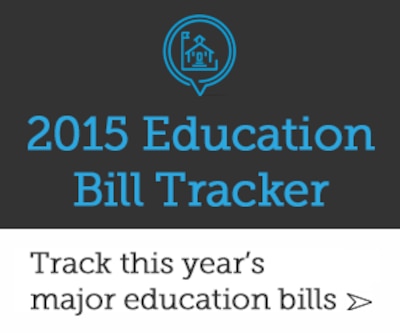A bill that would provide $10 million to help small rural school districts save money by sharing services passed the House Education Committee on a 10-1 vote, but the measure’s price tag likely will get close scrutiny later in the legislative session.
Earlier in the day, the full House gave 34-30 final approval to House Bill 15-1221, which would expand and extend the life of an existing state law that allows some parents unpaid time off from work to attend some school activities. Only one Republican voted for the bill, which other Republicans have argued is unnecessary. The brief floor debate reprised a long debate last Friday – see this story for details.
Without debate, the House gave preliminary approval to House Bill 15-1104, which would give a $250 tax credit to teachers who spend their own money to buy school supplies. This measure has a strong feel-good element to it, given that legislators from both parties agree it wouldn’t have a huge in impact on teachers’ taxes. (See this story for background.)
Inside the shared services bill
The rural schools measure, House Bill 15-1201, is intended to relieve some of the financial pressure felt by small districts, by allowing them to partner with boards of cooperative educational services to share some administrative services. It’s sort of an alternative to school district consolidation, long considered a political non-starter in Colorado.
While the bill has bipartisan support, an advantage in the split-control legislature, its $10 million cost will put it in the end-of-session competition over total K-12 spending.
“I realize it will have to compete with other bills as regards funding, and that’s fine,” said Rep. John Buckner, D-Aurora, who’s teaming with Rep. Bob Rankin, R-Carbondale on the proposal.

The $10 million would be used for a three-year grant program. BOCES would develop plans for shared services for interested districts and apply to the Department of Education for grants, which could be as large as $500,000. The program also would be open to charter schools.
Dale McCall, executive director of the Colorado BOCES Association, testified for the measure, saying, “We believe this bill would be especially helpful for the 38 districts in the state that have one administrator.”
McCall said possible shared services could include school nurses, information technology, transportation, data management and analysis, food services, and accounting.
Colorado has 148 districts that could take advantage of the grants, McCall said. That includes 104 districts with fewer than 1,000 students, plus another 44 larger districts that are officially defined as rural. The state has 178 districts.
Supporters of the bill acknowledged that current law allows BOCES and small districts to create sharing arrangements but said funding is needed to jump-start such initiatives.
Read the bill here.
Leaders of rural districts have long complained about what they feel are the administrative burdens of recent Colorado education initiatives, from testing to teacher evaluation to early literacy requirements. Another pending measure, House Bill 15-1155, would give small districts flexibility in evaluating students’ school readiness and reading levels, a prospect that makes some education reform lobbyists nervous.
Committee divided on discipline bill
House Education was less united on House Bill 15-1240, which would encourage school districts to reach formal agreements with their local police departments about what kinds of school incidents are referred to police. The bill passed 6-5.
The measure is sponsored by Rep. Rhonda Fields, D-Aurora, who’s been a tireless advocate of reducing what’s called the “school to prison pipeline” for minority students who get entangled with the police and courts because of school incidents. (Read the bill here.)
A more substantive bill on the issue is scheduled for Senate Education Committee consideration on Thursday. Senate Bill 15-184 would restrict the jailing of students for truancy. It’s sponsored by Sen. Chris Holbert, R-Parker, and by Fields.

